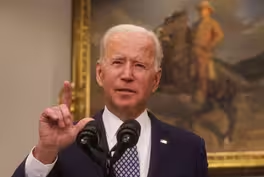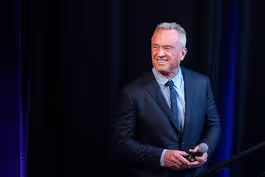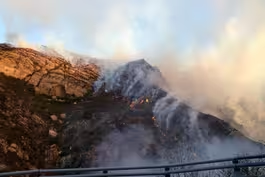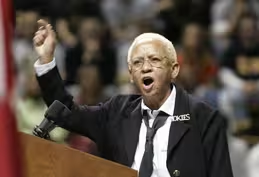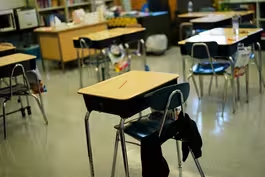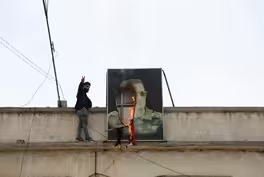
Cotton from Central Asia helps fuel Russia's war in Ukraine
Clip: 12/10/2024 | 8m 58sVideo has Closed Captions
How cotton from Central Asia is helping fuel Russia's war in Ukraine
It's been nearly three years since the start of the Russian invasion of Ukraine and despite huge losses on both sides, there is no sign that Putin's war machine is letting up. Cotton is used to make gunpowder and explosives and Russia has a steady supply from one of its former Soviet republics. Special correspondent Simon Ostrovsky investigated why that is, and who's trying to stop it.
Problems playing video? | Closed Captioning Feedback
Problems playing video? | Closed Captioning Feedback
Major corporate funding for the PBS News Hour is provided by BDO, BNSF, Consumer Cellular, American Cruise Lines, and Raymond James. Funding for the PBS NewsHour Weekend is provided by...

Cotton from Central Asia helps fuel Russia's war in Ukraine
Clip: 12/10/2024 | 8m 58sVideo has Closed Captions
It's been nearly three years since the start of the Russian invasion of Ukraine and despite huge losses on both sides, there is no sign that Putin's war machine is letting up. Cotton is used to make gunpowder and explosives and Russia has a steady supply from one of its former Soviet republics. Special correspondent Simon Ostrovsky investigated why that is, and who's trying to stop it.
Problems playing video? | Closed Captioning Feedback
How to Watch PBS News Hour
PBS News Hour is available to stream on pbs.org and the free PBS App, available on iPhone, Apple TV, Android TV, Android smartphones, Amazon Fire TV, Amazon Fire Tablet, Roku, Samsung Smart TV, and Vizio.
Providing Support for PBS.org
Learn Moreabout PBS online sponsorshipAMNA NAWAZ: It's been nearly three years since the Russian invasion of Ukraine, and there is no sign that Vladimir Putin's war machine is letting up, despite huge losses on both sides.
And while armies may march on their stomachs, as the saying goes, they can't actually shoot without cotton.
That staple commodity is used to make gunpowder and explosives, and Russia has a steady supply from one of its former Soviet republics.
Special correspondent Simon Ostrovsky investigated why that is and who's trying to stop it.
SIMON OSTROVSKY: One year ago, a powerful explosion tore through Tashkent, the capital of Uzbekistan, an authoritarian country that's Russia's top supplier of nitrocellulose, a substance used in the production of gunpowder and explosives Russia needs for its war in Ukraine.
The blast was so powerful it could be felt 18 miles away, according to local media reports.
It left a teenager dead, 163 others injured, and some 600 Tashkent residences damaged.
The date of the explosion, September 28, 2023, coincided with the visit of Michael Kurilla, a high-ranking commander in the U.S. military.
GEN. MICHAEL "ERIK" KURILLA, Commander, U.S. Central Command: Thank you all for your attendance here today.
SIMON OSTROVSKY: General Kurilla, who is the chief of U.S. Central Command, had just departed Uzbekistan after holding meetings with Uzbek defense officials, leading to speculation that the blast had something to do with him.
But there's an alternative explanation, and it comes from a couple thousand miles away.
My sources in Ukraine tell me they have a theory about what might have happened, and it ties back to Russia's war.
So I have come to Kyiv to see if I can find out more.
Ukraine's security services are acutely aware of the fact that Russia produces much of its gunpowder propellants from this.
It's a highly volatile substance called nitrocellulose, and much of it is derived from cotton pulp from the Central Asian states of Uzbekistan and Kazakstan.
Andriy Chernyak works for Ukraine's military intelligence service.
ANDRIY CHERNYAK, Defense Intelligence of Ukraine (through translator): All those missiles that are currently being launched at Ukraine and all the drones that hit the regions and Kyiv today, all of this is made with nitrocellulose.
SIMON OSTROVSKY: When the nitrocellulose exploded a year ago, it was in a logistics warehouse near the airport being readied for shipment to Russia, according to Agiya Zagrebelska, who drafts sanctions policy for the Ukrainian government.
But, she said, Uzbekistan considered halting the shipment under U.S. pressure, so Russian agents destroyed it.
AGIYA ZAGREBELSKA, National Agency on Corruption Prevention: It was sabotage for pushing Uzbekistan.
SIMON OSTROVSKY: Do you think it's possible that they destroyed the supply because they didn't want it to fall into Western hands?
AGIYA ZAGREBELSKA: Yes, absolutely.
I think that it's the main motivation.
SIMON OSTROVSKY: We're not sure what General Kurilla said in his meetings, because CENTCOM told "News Hour" that they wouldn't comment on private discussions between government officials.
But here's what we do know.
For over a year, the United States and its allies have been trying to get Uzbekistan and other countries to halt exports of the explosive nitrocellulose to Russia in an effort to hamper Moscow's ability to wage war in Ukraine.
And so far, it seems like those efforts have been unsuccessful.
According to Denys Hutyk of the Economic Security Council of Ukraine, Uzbekistan's skirted restrictions placed on the export of nitrocellulose by the Biden administration last year by increasing its exports of the substance nitrocellulose is made from instead, cotton pulp.
Without nitrocellulose, Russia's war machine would grind to a halt.
DENYS HUTYK, Economic Security Council of Ukraine: Nitrocellulose, once again, it's a final product.
It is produced already in the Russian Federation.
What Russia needs extremely is raw materials, cotton pulp.
And from what we can see right now, cotton pulp is included since the end of... (SIRENS BLARING) SIMON OSTROVSKY: OK, moving right along.
I mean, do you think that explosion that we just heard was made using nitrocellulose and cotton pulp?
DENYS HUTYK: Yes, it's possible.
So the propellant mix in most of Russian munitions, it is based on nitrocellulose.
SIMON OSTROVSKY: Even if it's a hypersonic missile?
DENYS HUTYK: Yes.
Yes.
SIMON OSTROVSKY: OK, we might have to continue the interview in a little while.
An air raid siren cuts our interview short as Russia launches another attack against the Ukrainian capital.
Russia still gets the lion's share of its cotton pulp and nitrocellulose from Central Asia, just like it always has.
And, invariably, it makes it into weapons like the missile that destroyed this children's hospital.
So what is stopping the United States from imposing sanctions against the companies that produce it?
In my search for answers, I traveled to Washington to speak with officials, diplomats and experts closely monitoring the situation.
John Herbst has served as U.S. ambassador to both Uzbekistan and Ukraine.
We have got a store of nitrocellulose.
It blows up.
What's your first thought?
Is it an accident?
Is it the Ukrainians?
Is it the Americans?
Or is it the Russians?
Who could have blown this thing up?
JOHN HERBST, Former U.S.
Ambassador to Ukraine: I'd be astonished if it was the Americans.
My first thought was, of course, the Russians.
Would the Ukrainians do that?
I don't know if they want to upset Uzbeks.
I think they'd rather court them, you might say, by diplomacy.
SIMON OSTROVSKY: And why would you be astonished if it was, say, the CIA?
JOHN HERBST: We certainly have the capacity to do such things.
I have just not seen such boldness in American national security policy over the past 3.5 years.
SIMON OSTROVSKY: That boldness is, however, on full display in Russia's relationship.
While U.S. diplomats work behind the scenes to influence Uzbekistan, Russia's President Vladimir Putin made an in-person trip to the country in May, securing a deal for a nuclear power plant, as cotton exports continued apace.
While there, Putin took a jab at American efforts to limit his country's trade with Central Asia, calling it imperialist behavior.
VLADIMIR PUTIN, Russian President (through translator): We know that pressure has also been applied in the Central Asia region.
But, somehow, I don't see everyone getting down on their knees to blindly follow directives from across the ocean.
SIMON OSTROVSKY: When asked about talks with Uzbekistan, the U.S. State Department said only that its goal is to deprive Russia of its ability to wage war IN Ukraine and restrict its access to revenue and dual-use materials for its arms industry.
JOHN HERBST: Uzbekistan does sit in one of the world's most difficult regions.
It has China, Iran, and Russia.
So they have to be cautious.
So the fact that the Uzbeks will make some arrangements with Moscow, or, for that matter, with Beijing is something we cannot -- we have to understand.
I think we just want to make sure that there are limits to that relationship.
SIMON OSTROVSKY: Meanwhile, a Reuters investigation recently revealed the U.S. and its allies are facing a critical shortage of nitrocellulose, limiting the West's ability to resupply Ukraine with vital munitions.
So could American influence flip Uzbekistan from being a problem for the West to a supplier for Ukraine?
JOHN HERBST: Either the U.S. government could buy this stuff itself and that maybe we could use it too.
We know that we are not producing enough arms.
Or it could help find someone who would buy.
And, obviously, Ukraine could be such a party.
SIMON OSTROVSKY: Meanwhile, the only real tools the West has to try to stop the flow to Russia is to bring sanctions against this man, Russian citizen Rustam Muminov.
Seen here with a delegation of Russian officials visiting Uzbekistan in June, Muminov controls about 85 percent of Uzbekistan's cotton pulp exports to Russia through just two factories, the Fergana chemical plant and the Jizzakh chemical plant, also known as Raw Materials Cellulose LLC.
DENYS HUTYK: Using sanctions and targeting those two legal entities and this individual, this Russian citizen, can have input on the direct supply chains of Russian defense industry.
SIMON OSTROVSKY: But even that may be difficult for the administration to do while cotton pulp remains exempt from U.S. export controls.
For the "PBS News Hour," I'm Simon Ostrovsky in Kyiv.
Can Biden issue preemptive pardons to protect Trump critics?
Video has Closed Captions
Clip: 12/10/2024 | 6m 44s | Can Biden issue preemptive pardons to protect Trump critics from retribution? (6m 44s)
The controversial vaccine policy changes RFK Jr. could make
Video has Closed Captions
Clip: 12/10/2024 | 7m 59s | The controversial changes RFK Jr. could make to vaccine policy as HHS chief (7m 59s)
Investigators reveal possible motives in CEO killing
Video has Closed Captions
Clip: 12/10/2024 | 3m 34s | Investigators reveal clues to alleged gunman's possible motives in health care CEO killing (3m 34s)
News Wrap: Thousands ordered to evacuate Malibu wildfire
Video has Closed Captions
Clip: 12/10/2024 | 5m 30s | News Wrap: Thousands ordered to evacuate as wildfire burns near Malibu (5m 30s)
Remembering the fierce and lyrical voice of Nikki Giovanni
Video has Closed Captions
Clip: 12/10/2024 | 5m 7s | Remembering the fierce and lyrical voice of poet Nikki Giovanni (5m 7s)
Researchers report stunning surge of misogyny post-election
Video has Closed Captions
Clip: 12/10/2024 | 6m 51s | Researchers report stunning surge of misogyny post-election (6m 51s)
Syria's new leaders work to keep rebel factions united
Video has Closed Captions
Clip: 12/10/2024 | 6m 27s | Syria's new leaders work to keep rebel factions united after overthrow of common enemy (6m 27s)
Providing Support for PBS.org
Learn Moreabout PBS online sponsorshipSupport for PBS provided by:
Major corporate funding for the PBS News Hour is provided by BDO, BNSF, Consumer Cellular, American Cruise Lines, and Raymond James. Funding for the PBS NewsHour Weekend is provided by...
